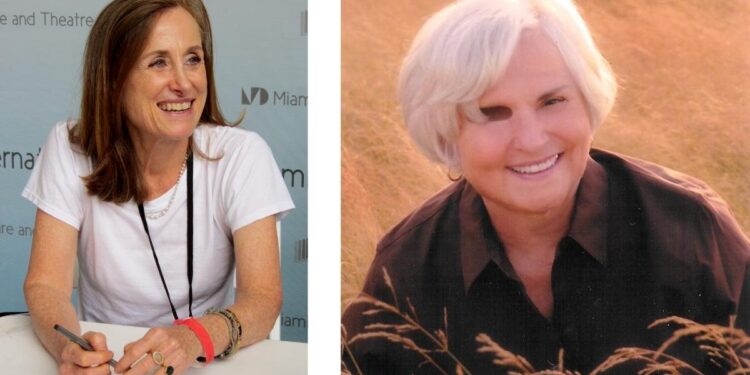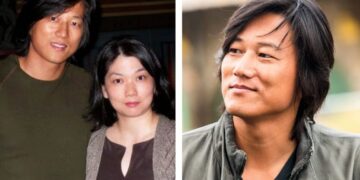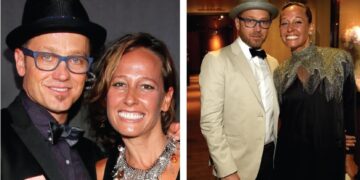Before the name Joanne Schieble was ever associated with Steve Jobs, she was simply a young woman raised in a conservative German-American family in Wisconsin. Born in 1932, Joanne grew up in a time when societal expectations for women were far more rigid and narrow than today. Education was one of her key pursuits, and she eventually attended the University of Wisconsin, where her life would take an unexpected and transformative turn. While studying there, she met Abdulfattah “John” Jandali, a Syrian immigrant and political science graduate student. Their relationship, although deeply affectionate, was shadowed by cultural differences and family resistance that would ultimately shape the trajectory of several lives.
Joanne Schieble’s father, Arthur Schieble, vehemently disapproved of her relationship with Jandali, not because of the man’s character, but due to his Middle Eastern background and Muslim faith—an attitude not uncommon in the 1950s. Joanne became pregnant in 1954, while still unmarried and under immense pressure from her family. With limited options available and fearing social and familial backlash, she made a difficult choice that would reverberate through history: she gave her son up for adoption.
Quick Bio
| Detail | Information |
| Full Name | Joanne Carole Schieble |
| Also Known As | Joanne Simpson |
| Date of Birth | August 1, 1932 |
| Place of Birth | Wisconsin, United States |
| Parents | Arthur Schieble and an unnamed mother |
| Notable For | Biological mother of Steve Jobs |
| Education | University of Wisconsin |
| Marriage | Abdulfattah Jandali (relationship), later married George Simpson |
| Children | Steve Jobs (biological), Mona Simpson (daughter with George Simpson) |
| Occupation | Speech therapist, academic involvement |
Giving Birth to a Future Visionary
In February 1955, Joanne Schieble gave birth to a baby boy in San Francisco. That boy would grow up to become Steve Jobs, one of the most influential tech entrepreneurs of the 20th century. At the time, Joanne was determined to place her son in a home that met specific standards—particularly, she wanted educated parents to raise him. The first adoption plan fell through when the prospective parents decided they wanted a girl instead. Eventually, Paul and Clara Jobs, a working-class couple, adopted the child.
Joanne initially resisted signing the adoption papers because the Jobs family hadn’t attended college. However, she relented after they promised to ensure that her son would someday receive a college education. Despite this early disagreement, the Jobs family raised Steve with love, support, and a modest middle-class lifestyle in Mountain View, California. Joanne’s decision, made under the constraints of her era, not only gave Steve Jobs a new family but also provided him with an environment that encouraged his curiosity and ambition.
The Aftermath: Silence and Rebuilding
After placing Steve Jobs for adoption, Joanne Schieble returned to her academic life, eventually earning her degree. She went on to marry George Simpson, a fellow academic and writer. Their union produced a daughter named Mona Simpson, born in 1957. Joanne focused on raising Mona and building a stable life, distancing herself from the emotional complexities surrounding her earlier decision.
Notably, Mona would grow up to become a successful novelist, and her writing often reflected themes of identity, family, and reconciliation—perhaps mirroring the unspoken legacy that Joanne carried with her. Joanne Schieble never publicly discussed her relationship with Steve Jobs until later in life, and even then, she remained a largely private figure.
Reuniting with Steve Jobs
Steve Jobs discovered the identity of his biological parents in his twenties, but he did not make contact with them immediately. Over time, curiosity got the better of him, and he eventually connected with his birth mother, Joanne Schieble. The two built a relationship based on mutual respect and a willingness to understand the difficult decisions of the past. According to various biographical sources, including Walter Isaacson’s Steve Jobs, he maintained a warm relationship with Joanne and came to accept her choices, understanding the social limitations she faced in the 1950s.
Interestingly, Steve Jobs was also introduced to his biological sister, Mona Simpson, during this period. The two developed a close sibling bond, and Jobs even attended her book readings and supported her literary career. This reunion provided Joanne Schieble with a second chance to connect with the child she had once given up, offering some form of emotional resolution, even if decades in the making.
The Cultural and Historical Context
Joanne Schieble’s story is not just personal—it reflects a broader narrative of mid-20th-century America. During the 1950s, the stigma surrounding unwed mothers was severe. Adoption was often the only socially “acceptable” outcome for pregnancies outside of marriage. The idea of a young, educated, unmarried woman becoming a single mother was taboo. Joanne’s experience sheds light on the pressure women faced to conform to societal expectations, even when those norms came at great personal cost.
It is also important to note the racial and cultural biases at play. Joanne’s father rejected her relationship with a Syrian man, not due to any personal failing on Jandali’s part, but purely on the basis of ethnicity. This cultural prejudice ultimately shaped Steve Jobs’ destiny, steering him toward adoption and an entirely different upbringing. Thus, Joanne’s story is interwoven with themes of gender, race, family, and societal constraints—elements that continue to resonate today.
Her Later Years and Final Days
Joanne Schieble lived a quiet life in later years. She was not one to seek attention, despite being the biological mother of one of the most famous individuals in modern history. While Mona Simpson maintained a public presence through her writing, Joanne remained out of the spotlight. Her decision to maintain privacy, even as public interest in Steve Jobs’ origins grew, underscores her consistent desire to shield her family from unnecessary scrutiny.
In her later years, Joanne was supported by both her children—Steve and Mona. Jobs even provided for her financially, ensuring that she had access to good care and a comfortable lifestyle. This quiet reconciliation was a far cry from the dramatic upheaval of her earlier years, suggesting a kind of poetic closure to a life marked by complexity.
Legacy Through Her Children
Though Joanne Schieble never founded a company or wrote a bestselling novel, her legacy lives on through her children. Steve Jobs changed the world through his innovations at Apple, Pixar, and beyond. Mona Simpson contributed richly to American literature. Both children, raised under different circumstances and by different families, carried aspects of Joanne’s intelligence, creativity, and resilience.
It is perhaps fitting that Steve Jobs, who often spoke about the role of intuition and emotional depth in design, came from a woman who made her life’s most pivotal decisions from the heart. Joanne’s story serves as a powerful reminder that behind even the most groundbreaking public figures, there are often quiet, complicated stories that deserve to be told.
Why Joanne Schieble’s Story Matters Today
In today’s world, where conversations about women’s rights, cultural identity, and social justice are front and center, the story of Joanne Schieble holds new relevance. Her life illustrates how personal choices are often shaped—and limited—by the cultural and familial constraints of their time. It also shows how resilience and forgiveness can foster healing, even decades after a difficult decision is made.
Moreover, her story challenges the notion that legacy is always defined by public achievement. Joanne may never have stood on a stage like her son did, but her choices, courage, and values echo in the work and influence of her children. In this sense, her legacy is profound, even if it remains largely unsung.
Conclusion
Joanne Schieble was much more than the biological mother of Steve Jobs. She was a bright, determined woman navigating a society that offered her few choices. Her life was marked by difficult decisions, emotional sacrifice, and quiet strength. While she may not have invented the iPhone or written award-winning novels, her influence lives on through the impact her children have made on the world.
Her story deserves to be remembered not just as a footnote in Steve Jobs’ biography, but as a narrative of its own—rich with human complexity, cultural context, and emotional truth. In understanding Joanne Schieble, we gain a fuller picture of where greatness comes from—and the quiet, often invisible sacrifices that make it possible.
Frequently Asked Questions (FAQs)
1. Who was Joanne Schieble?
- Joanne Schieble was the biological mother of Apple co-founder Steve Jobs. She later married George Simpson and became the mother of novelist Mona Simpson.
2. Why did Joanne Schieble give Steve Jobs up for adoption?
- She gave Steve Jobs up for adoption due to familial and societal pressure, particularly her father’s disapproval of her relationship with Steve’s biological father, Abdulfattah Jandali.
3. Did Joanne Schieble ever reunite with Steve Jobs?
- Yes, Steve Jobs reunited with Joanne later in life, and they maintained a cordial and supportive relationship.
4. What was Joanne Schieble’s profession?
- She was involved in academic work and is believed to have worked as a speech therapist at one point in her life.
5. Is Joanne Schieble still alive?
- As of available public records and reports, Joanne Schieble has passed away, though she lived a private and quiet life outside of the public spotlight.


















